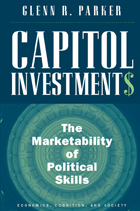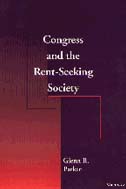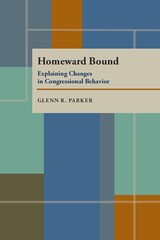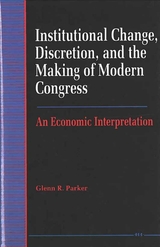
“Who would spend millions for a job that pays $250k? Parker’s answer will surprise you. Required reading for Congress jocks.”
—Michael C. Munger, Duke University
“A unique and interesting approach to the study of legislators and legislative institutions.”
—David Brady, Stanford University
What would you do if, the very day you were hired, you knew you could be unemployed in as little as two years? You’d seek opportunities in your current job to develop a portfolio of skills and contacts in order to make yourself more attractive to future employers. Representatives and senators think about their jobs in Congress in precisely this way, according to Glenn R. Parker.
While in office, members of Congress plan not merely for the next election but for the next stage of their careers. By networking, serving on committees, and championing particular legislation, they deliberately accumulate human capital—expertise, networks, and reputation—which later gives them advantages on the job market. Parker’s study of the postelective careers of more than 200 former members of Congress who left office during the last half century shows that, in most cases, the human capital these politicians amassed while in office increased their occupational mobility and earning power.

Skillfully blending historical data with microeconomic theory, Glenn Parker argues that the incentives for congressional service have declined over the years, and that with that decline has come a change in the kind of person who seeks to enter Congress. The decline in the attractiveness of Congress is a consequence of congressional careerists and of the growth in the rent-seeking society, a term which describes the efforts of special interests to obtain preferential treatment by using the machinery of government--legislation and regulations.
Parker provides a fresh and controversial perspective to the debate surrounding the relative merits of career or amateur politicians. He argues that driving career politicians from office can have pernicious effects on the political system: it places the running of Congress in the hands of amateur politicians, who stand to lose little if they are found engaging in illegal or quasi-legal practices. On the other hand, career legislators risk all they have invested in their long careers in public service if they engage in unsavory practices. As Parker develops this controversial argument, he provides a fresh perspective on the debate surrounding the value of career versus amateur politicians.
Little attention has been given to the long-term impact of a rent-seeking society on the evolution of political institutions. Parker examines empirically and finds support for hypotheses that reflect potential symptoms of adverse selection in the composition of Congress: (1) rent-seeking politicians are more inclined than others to manipulate institutional arrangements for financial gain; (2) the rent-seeking milieu of legislators are more likely to engage in rent-seeking activity than earlier generations; (3) and the growth of rent-seeking activity has hastened the departure of career legislators.
Glenn R. Parker is Distinguished Research Professor, Florida State University.

Richard Fenno first coined the term home style to describe the ways in which members of Congress cultivate the voters of their home constituencies. He suggested that incumbents were paying more attention to their constituents than they had in the past. In this book, Glenn Parker examines the relationship between activities at home and in Washington, asking specifically: Why and when did congressmen and senators begin to pay more attention to their constituents? And what are the institutional consequences of this change?
Using data drawn from the travel vouchers filed by incumbent senators and congressmen between 1959 and 1980, Parker shows that since the mid-1960s incumbents have been placing greater emphasis on service to their state or district. Congress has facilitated this change in various ways, such as by increasing travel allowances and by scheduling that minimizes the conflict between legislative business in Washington and time spent with constituents.
Parker's study includes both the Senate and House, and he draws distinctions between the home-style behaviors of senators and representatives. He also provides a historical context for understanding the dynamics of changes in home style. The time-series data generate explanations that specify relationships among historical conditions, individual behavior, and institutional structures.

READERS
Browse our collection.
PUBLISHERS
See BiblioVault's publisher services.
STUDENT SERVICES
Files for college accessibility offices.
UChicago Accessibility Resources
home | accessibility | search | about | contact us
BiblioVault ® 2001 - 2024
The University of Chicago Press









